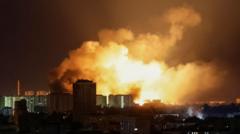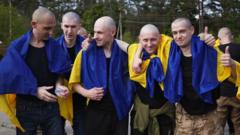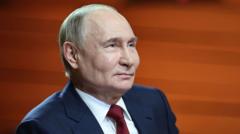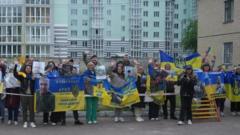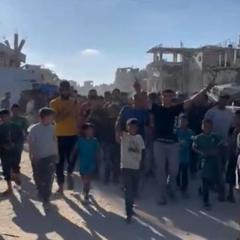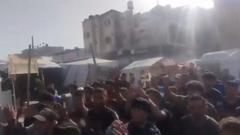**In a recent address, Ukrainian President Zelensky highlighted the re-deployment of North Korean troops to the front lines, indicating ongoing military losses on both sides as the conflict in Ukraine persists.**
**North Korean Troops Reported Re-deployed to Ukraine Front Lines Amid Heavy Casualties**
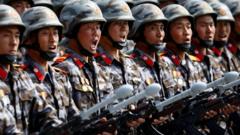
**North Korean Troops Reported Re-deployed to Ukraine Front Lines Amid Heavy Casualties**
**Zelensky claims North Korean soldiers return to combat in Russia’s Kursk region, escalating international tensions.**
In a significant development in the ongoing Ukraine conflict, President Volodymyr Zelensky stated that North Korean soldiers have been sent back to the front lines in Russia’s Kursk region, a revelation made during a video address. This announcement follows earlier reports suggesting that North Korean forces had been withdrawn due to substantial casualties sustained in recent combat.
Zelensky remarked that the Russian military had reintroduced North Korean troops to conduct "new assaults" in areas of Ukraine still contested. According to him, hundreds of personnel from both Russia and North Korea have been "destroyed" in these ongoing operations. Western military analysis indicates that at least 1,000 of the North Korean 11,000 troops deployed to Ukraine have been lost since January, raising concerns about the sustainability of continuing such losses.
Reports from Ukrainian special forces indicate that North Korean soldiers had not been sighted in Kursk for the preceding 21 days, strengthening the notion that they had been extracted following intense fighting. Intelligence reports from South Korea describe the North Korean forces as inadequately prepared for contemporary battle scenarios, particularly vulnerable against advanced Ukrainian drone warfare.
The deployment of North Korean troops aligns with an increase in military cooperation between Russia and North Korea, exemplified by a recent security and defense treaty between Russian President Vladimir Putin and North Korean leader Kim Jong Un. This alliance may have tactical implications as North Korea reportedly provides significant military supplies to bolster Russian forces amid their extensive losses.
While Russia has not updated its official casualty figures since September 2022, estimates from various sources imply that Russian military losses may exceed 350,000, with Ukrainian forces also suffering substantial casualties estimated at over 45,000.
Recent military initiatives have seen Ukraine conducting offensive operations in Kursk, having previously reclaimed more than 1,000 square kilometers from Russian control six months ago. However, clashes have persisted as both sides contest strategic locations. Zelensky confirmed a renewed Ukrainian offensive in the region, advancing approximately 2.5 kilometers, though Russian officials contend that their defenses have successfully repelled these attacks.
In light of these developments, discussions on a resolution might soon occur, as speculation suggests that U.S. President Donald Trump could be meeting with both Zelensky and Putin to explore pathways to end the conflict. The multifaceted dynamics of the situation reflect the complexities of international relations amid the war.
Zelensky remarked that the Russian military had reintroduced North Korean troops to conduct "new assaults" in areas of Ukraine still contested. According to him, hundreds of personnel from both Russia and North Korea have been "destroyed" in these ongoing operations. Western military analysis indicates that at least 1,000 of the North Korean 11,000 troops deployed to Ukraine have been lost since January, raising concerns about the sustainability of continuing such losses.
Reports from Ukrainian special forces indicate that North Korean soldiers had not been sighted in Kursk for the preceding 21 days, strengthening the notion that they had been extracted following intense fighting. Intelligence reports from South Korea describe the North Korean forces as inadequately prepared for contemporary battle scenarios, particularly vulnerable against advanced Ukrainian drone warfare.
The deployment of North Korean troops aligns with an increase in military cooperation between Russia and North Korea, exemplified by a recent security and defense treaty between Russian President Vladimir Putin and North Korean leader Kim Jong Un. This alliance may have tactical implications as North Korea reportedly provides significant military supplies to bolster Russian forces amid their extensive losses.
While Russia has not updated its official casualty figures since September 2022, estimates from various sources imply that Russian military losses may exceed 350,000, with Ukrainian forces also suffering substantial casualties estimated at over 45,000.
Recent military initiatives have seen Ukraine conducting offensive operations in Kursk, having previously reclaimed more than 1,000 square kilometers from Russian control six months ago. However, clashes have persisted as both sides contest strategic locations. Zelensky confirmed a renewed Ukrainian offensive in the region, advancing approximately 2.5 kilometers, though Russian officials contend that their defenses have successfully repelled these attacks.
In light of these developments, discussions on a resolution might soon occur, as speculation suggests that U.S. President Donald Trump could be meeting with both Zelensky and Putin to explore pathways to end the conflict. The multifaceted dynamics of the situation reflect the complexities of international relations amid the war.





